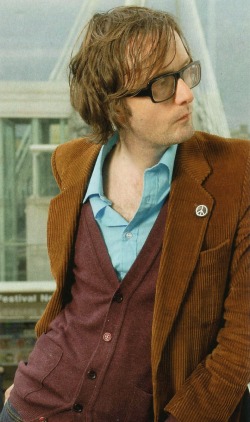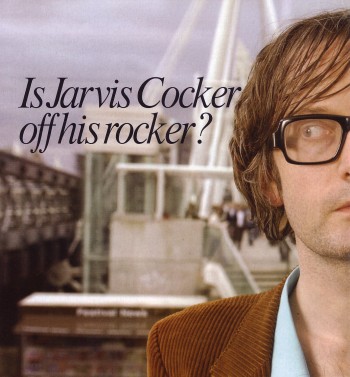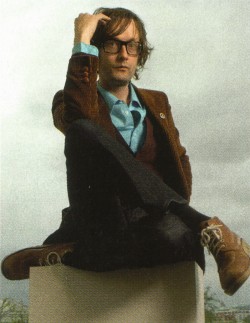
 Is Jarvis Cocker Off His Rocker?
Is Jarvis Cocker Off His Rocker?Encompassing veteran metallers Motörhead, music from Dumbo and more than a sprinkling of certifiable 'outsider' artists, this year's Meltdown promises to be the most bonkers yet. Time Out goes inside the head of curator Jarvis Cocker to find out what the hell he was thinking.
After starring in seemingly every other Meltdown in history, Jarvis Cocker finally gets his shot at curating the multi-disciplinary arts festival at that other national cultural institution, the Southbank Centre this week. His choices for the line-up are as esoteric, extraordinary and downright fearless as you might expect, encompassing everything from Motörhead's thrash-fuzz (followed by a northern soul disco) to a cabaret spectacular of Disney songs performed by an all-star line-up including Jarvis himself.
Most excitingly for fans of original weirdness, there's a performance from former 13th Floor Elevator Roky Erickson who is, amazingly, still alive and ready to rock. We initially thought Jarvis would have some extraordinary stories to tell about coaxing the likes of 'twisted folkstress' Melanie out of retirement or persuading Canadian beatmaster Gonzales to assemble his participation-happy, multimedia piano performance. But he didn't; it was all quite easy, apparently. However, he did take the time to give us an insight into the thinking behind his 'personal cultural greatest hits'...
In the beginning there was Motörhead...
"They're all things that have had some kind of effect on me in various stages of my life, going quite far back in some cases. The logic behind Motörhead starting everything off - apart from the fact that you won't be able to ignore the fact that the festival has started because they're loud - is that the very first show that I ever played with Pulp was on July 5 1980 at Rotherham Arts Centre and we finished our performance with our version of Leaving Here, which was on the Motörhead Golden Years EP. I think it was a Motown song [it was, originally recorded by Eddie Holland himself and later covered by Ron Wood's band The Birds in 1965], so we were covering Motörhead's cover. Our version was piss poor - very weedy, not loud at all - but it seemed to make sense that because they'd been there at the very start of my musical career, I thought: Well, they can start the Meltdown."
Forest Of No Return: The Disney Songbook
"This was a bit of a leap in the dark, but I think it's worth having a go, because it's something that people are familiar with but only associate it with one thing - those films. I think it's kind of interesting to take it [the songs] out of there and see what happens. I do think that great art doesn't always have to come from obvious places. There's a track on my album called Disney Time that's a reaction to a particular song which is called Baby Mine from Dumbo, which had me in floods of tears. My son was watching Dumbo, and I hadn't seen it before, and that kind of sparked me. I think it was Dennis Potter who said that thing about the potency of cheap music, and Disney stood by that. You kind of hate yourself for being affected by it, you think: God I'm really being manipulated here, and it's so sentimental, but it does have some kind of power. Not so much now with your Phil Collins-type soundtracks; in a way that kind of Disney music is something that doesn't exist any more, so somehow it starts to get interesting when you've got a bit of distance from it. I think we're gonna leave packets of handkerchiefs on the chairs. Or people might piss themselves; there might be tears of laughter at someone's terrible attempt to do Chim Chim Cheree or something.

KPM Allstars Play The Hits Of TV
"I'm looking forward to that, I think it's gonna work pretty well. I heard about that because a friend of mine had been to see something they did at the Jazz Café not long ago. Again, people will recognise the stuff, because it's like the theme from Countdown: music that you're aware exists but unless you're one of those people that buy TV theme albums, it wouldn't be something you'd have in your house and listen to. Especially with Countdown - it just fills in the time while you're trying to organise your consonants and your vowels. It's interesting to get the people who played on the actual things - and some of the composers will be there as well - people who normally would be kind of invisible."
The Meltdown philosophy
"I'd kind of fantasised: Oh yeah, if I ever got a Meltdown... So when I was first asked to do it, obviously I was pretty amazed. Then anxiety started to creep in. Because you're only going to get the chance to do this once, so you've got to get it right. I started getting really over-anxious about it. I even went out and bought myself a whiteboard and those markers and, any time an idea would come to me, I'd write it down, and I ended up with this big list of bands and stuff. It's not just who you book, it's how you're going to combine things. I wanted it to be similar to that compilation The Trip that me and Steve [Mackey, ex-Pulp bassist] did, of trying to put things next to each other that you wouldn't necessarily think go together, but somehow it hangs together."
Audience participation required
"I thought it would be good to try to present stuff that you wouldn't get to see every day. I just heard that Gonzales has been doing this show... Actually, I still don't know exactly what he does. You see him playing the piano on a screen but I think he gets the audience to help him write a song or something. I don't know exactly how it works but it's some kind of audience participation, I know that. That was another bee that I had in my bonnet, this idea that culture should not be a sedative, it should be a stimulant; that was my big ethos for it. So part of that was wanting to have as many events as possible where people get involved. I don't want it to be a traumatic experience, because I hate it myself; it is bad if you go to a pantomime or you're at the circus and you get forced to go on. I don't want people to feel that they're gonna get picked on. It's actually fun to get involved in it, it's not bullying. I'm not saying everybody's asleep and I will wake them all from their slumber, but ideally what I'd like Meltdown to be is a drop-in centre, where people could meet, like say, "I'll meet you down the Southbank", and then there probably will be something going on."
Meltdown fringe
"I'm putting together a film programme thing for in the basement, so you can just wander in and sit and watch something. You don't have to have a ticket or anything, and there's gonna be some art there as well. They call it the Spirit Level, but for the duration of the Meltdown it's gonna be known as Jarvis Cocker's Subconscious, because it's in the basement. We're hoping to have a bit of a Speaker's Corner, where people can put their name down and talk about any subject, as long as it doesn't stir up racial hatred or religion. I don't want people to talk about religion because that's the boring thing about Speaker's Corner in Hyde Park; there's always someone banging on about religion. I'd rather that people try to think of some interesting idea that they'd like people to consider, like we should all be naked all the time, or we should only eat food which is yellow, or whatever. So I'm hoping those kind of things will give it a life of its own, so that it isn't just a series of concerts, that it is more a bit of a festival."
Outsider art
"I got into outsider art when I was at art college, probably as a reaction against being at art college. There seemed to be quite a lot of people who were just at art college for the pose, really. And then I came across this book in the library called Art Brut, and the idea of people who weren't affected by the dominant culture of the time. The only downside is that most of these people were in lunatic asylums. That was the way to escape being affected by the dominant culture, you had to be off your head. But this idea appealed to me. It's great when people do things a different way, and it doesn't have to go through the official channels."
"I'm not thinking: Yeah, Meltdown could break Sunn O))), for example, and they're gonna get straight to the top of the charts. It's never gonna happen is it? They're a good example, though. On paper, you'd think it was gonna be awful, something that's gonna last an hour and ten minutes that's basically one chord. You think: Fucking hell, that sounds really dull. But it's not just some blokes turning everything up really loud and pissing about, it's really controlled. And you listen to the music in a different way; because it's one chord you're not thinking: Wow, yeah, I'm humming this one when I go home. When I saw them at the Frieze Art Fair, it was more like a physical experience. When the bass got really low at one point, we were stood near the bar and all the optics behind the bar started shaking and glasses were falling off the shelves and all the bar staff had to go over and shore it all up. The actual frequencies had physical effects on you, so it shows you that music doesn't have to be something you listen to with your ears, it actually moves your internal organs about. They've been changing the acoustics of the Festival Hall, so we'll be able to give it a good test."
